Changing your electric guitar strings might not be a guitarist’s everyday thought. Many of us are creatures of habit, sticking with a brand and gauge we know and like, often for years. However, if this sounds like you, you might be missing out. A fresh set of Good Electric Guitar Strings can dramatically improve your instrument’s playability and sound.
With a huge variety of electric guitar string brands available, deviating from your usual choice can feel overwhelming. To simplify things, we’ve curated a selection of top electric guitar strings, categorized by use case, to help you narrow down your options. Whether you’re seeking the best coated electric guitar strings like Elixir Optiweb for longevity, or a reliable set like Ernie Ball Slinkys for everyday playing, you’ll discover excellent choices here.
This guide also includes a section on how to choose the right strings, offering valuable advice for finding the perfect set for your playing style. For deeper insights, our FAQs section addresses common questions about electric guitar strings, providing expert guidance.
Product Guide
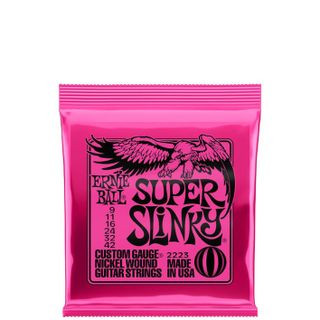 Ernie Ball Super Slinky electric guitar strings pack
Ernie Ball Super Slinky electric guitar strings pack
Best Overall
- Ernie Ball Slinky
Materials: Nickel-plated
Coating: No
Pros:
- Tried and tested
- Durable
- Great sound
Cons:
- Some players prefer coated strings
Ernie Ball Slinky sets are globally renowned and among the best-selling electric guitar and bass strings for good reason. These nickel-plated strings effectively blend performance, durability, sound quality, and affordability, making them a versatile choice for many guitarists.
The Slinky range is extensive, offering 17 different gauges, from the super light 8-38 gauge Extra Slinky to the heavy 12-62 gauge Mammoth Slinky. They even have strings designed for baritone guitars. Ernie Ball has also introduced ‘half’ gauges like the 10.5-52 Mondo Slinky, ensuring there’s a Slinky set to match virtually any playing style. These are consistently reliable, providing the balanced tone and feel that many guitarists seek in good electric guitar strings.
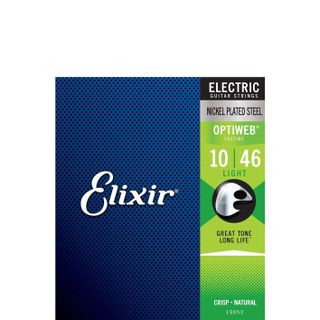 Elixir Optiweb coated electric guitar strings pack
Elixir Optiweb coated electric guitar strings pack
Best Coated
- Elixir Optiweb
Materials: Nickel-plated steel-wrapped wire
Coating: Optiweb
Pros:
- Extremely hard-wearing
- Coating minimally impacts sound
- Bright and resonant
Cons:
- Feel might not suit everyone
Elixir is a leading brand in coated strings, utilizing its patented Optiweb treatment to extend string life. While some guitarists worry that coating diminishes a string’s natural resonance, Elixir strings stand out.
Our tests showed that Elixir Optiweb strings retain a bright and resonant sound, similar to uncoated strings, but with significantly improved longevity. While regular string changes are still recommended for optimal tone, Elixir Optiwebs are a great choice if you need good electric guitar strings that last longer without sacrificing sound quality. They are ideal for players who want to reduce string changes and maintain consistent performance over time.
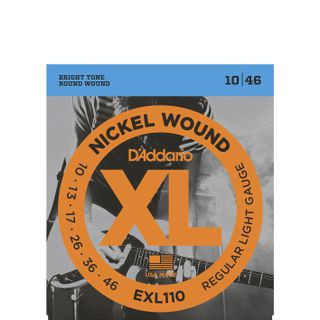 D'Addario XL Nickel Wound electric guitar strings pack
D'Addario XL Nickel Wound electric guitar strings pack
Best Beginner
- D’Addario XL Nickel Wound
Materials: Nickel-wound
Coating: No
Pros:
- Massive range of materials and constructions
- Wide gauge options
- A best-selling, reliable choice
Cons:
- Extensive options might be overwhelming for beginners
The D’Addario XL range is incredibly diverse, featuring six different construction methods, each with unique tonal characteristics. This includes XL Chromes (flatwound for smooth low-end), XL Nickel Wound (versatile ‘everyday’ strings), XL Pure Nickel (vintage tone), XL Prosteels (high output and bright), XL Half Rounds (semi-flat for altered feel), and XL Coated Nickel (extended lifespan).
For our tests, we used the XL Nickel Wound strings and found their tone to be a well-balanced mix of brightness, punch, and low-end warmth – neither too bright nor too dark. The D’Addario XL Nickel Wound strings are a fantastic starting point for new players, offering reliability and versatility as they explore different sounds and playing styles. They are a benchmark for good electric guitar strings and a popular choice for players of all levels.
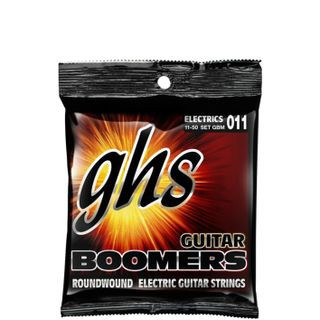 GHS Boomers electric guitar strings pack
GHS Boomers electric guitar strings pack
Best Value
- GHS Boomers
Materials: Roundwound nickel-plated steel
Coating: No
Pros:
- Bright tone
- Nickel-plated for balanced sound
- Reasonably priced
Cons:
- Limited gauge range
GHS Boomers deliver a bright tone thanks to their nickel-plated steel wrap around a round steel core. Historically, pure nickel was used for guitar strings, but nickel-plated steel became the standard for its enhanced tonal properties and durability.
Boomers provide excellent performance at a price that won’t break the bank. While their gauge selection isn’t as extensive as some other brands, the available options are high-quality. Overall, GHS Boomers are exceptional value electric guitar strings, offering a bright and punchy tone. However, their brightness might be too much for players seeking a warmer, mellower sound, so consider your tonal preferences.
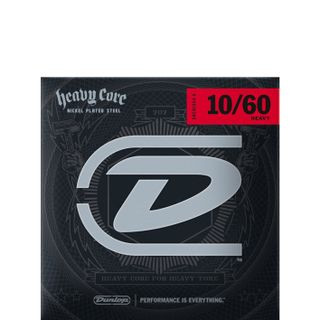 Dunlop Heavy Core electric guitar strings pack
Dunlop Heavy Core electric guitar strings pack
Best for Metal
- Dunlop Heavy Core
Materials: Nickel-plated steel
Coating: No
Pros:
- Excellent for heavier music styles
- Ideal for downtuning
- Strong and durable
Cons:
- Not suited for lighter playing styles
Players who frequently use lower tunings (below standard E) often encounter muddy tones and floppy strings. Dunlop Heavy Core strings are designed to solve these issues with a modified winding ratio, making them perfect for downtuned playing and heavier styles.
Testing revealed that Heavy Core strings provide a defined low end, clear mids, and enhanced durability for aggressive palm muting and heavy riffing. They excel in downtuned scenarios, maintaining clarity and tension where standard strings might fail. If you play metal or djent and need good electric guitar strings for low tunings, Dunlop Heavy Core is an excellent choice, providing the stability and tone needed for aggressive playing.
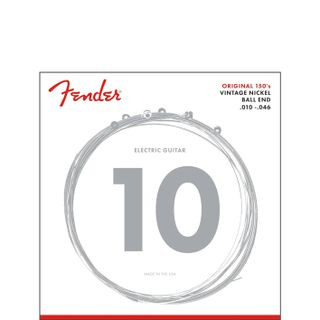 Fender Pure Nickel electric guitar strings pack
Fender Pure Nickel electric guitar strings pack
Best for Strat
- Fender Pure Nickel
Materials: Pure nickel core, wrapped with nickel wire
Coating: No
Pros:
- Vintage-style tone
- Reduced finger squeak
- Blues-friendly warm sound
Cons:
- Not ideal if you prefer a modern, brighter tone
If you own a Stratocaster, Fender Pure Nickel strings are worth considering. Featuring a pure nickel core and wrap, these strings deliver classic vintage tone and have the added benefit of reducing finger squeak.
Our testing showed that Fender Pure Nickel strings bring a warm brightness that complements single-coil pickups beautifully. While perhaps not the best choice for heavy metal, they excel in blues, rock, and other genres where vintage warmth is desired. They feel smooth and comfortable right out of the pack, and the pure nickel construction allows your guitar’s natural resonance to shine through. For Strat players seeking to maximize vintage tone, these are good electric guitar strings.
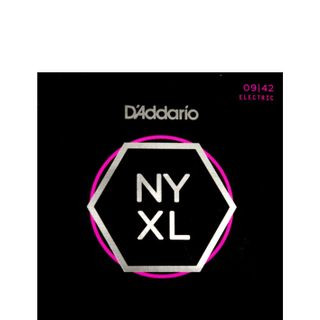 D'Addario NYXL electric guitar strings pack
D'Addario NYXL electric guitar strings pack
Best for Bends
- D’Addario NYXL
Materials: Nickel-plated
Coating: No
Pros:
- Exceptional for whammy bar use
- Superior tuning stability
- Extensive gauge range
Cons:
- Pricier than standard non-coated strings
D’Addario NYXL strings are engineered for strength and stability. Utilizing a high-carbon steel core with nickel-plating, NYXLs are designed to withstand aggressive playing styles and heavy whammy bar use without losing tuning.
D’Addario emphasizes tuning stability as a key feature, and our tests confirmed this. Their construction and materials result in significantly better tuning retention compared to standard steel strings. With nearly 20 gauge options, finding an NYXL set to suit your preferences is easy. While they are more expensive than some non-coated strings, the enhanced performance and reliability make them a worthwhile investment, especially for players who value tuning stability and string durability in good electric guitar strings.
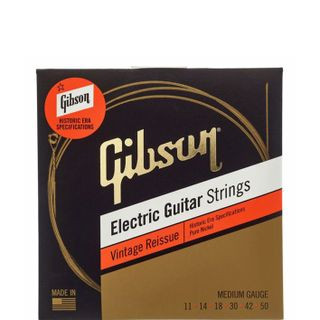 Gibson Vintage Reissue electric guitar strings pack
Gibson Vintage Reissue electric guitar strings pack
Best for Blues
- Gibson Vintage Reissue
Materials: Pure nickel
Coating: No
Pros:
- 100 percent pure nickel construction
- Warm, clear tone
- Excellent for string bends
Cons:
- Tone can be too warm for some styles
Continuing the pure nickel trend, Gibson Vintage Reissue strings are made from 100% pure nickel, delivering a warm tone with remarkable clarity. The pure nickel composition creates a mellow feel and enhances string bending ease, making them ideal for blues and classic rock.
During testing, we noticed these strings naturally push you towards using your bridge pickup more often due to their inherent warmth. Gibson offers variations in this range, including nickel-plated Brite Wires and Les Paul-specific sets. However, the Vintage Reissue set stands out for its specific vintage-inspired tone and performance, making them excellent good electric guitar strings for blues players seeking authentic warm tones and smooth playability.
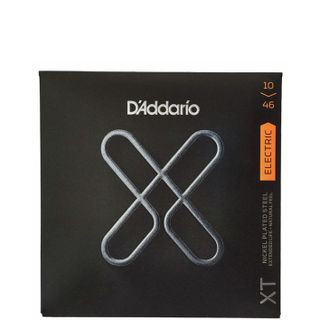 D’Addario XT electric guitar strings pack
D’Addario XT electric guitar strings pack
Best Durability
- D’Addario XT
Materials: High-carbon steel core, nickel-plated steel
Coating: Yes
Pros:
- D’Addario’s flagship coated range
- Coating on all strings (not just wound strings)
- Great feel and long-lasting tone
Cons:
- Coating might feel slightly slippery to some
D’Addario XT strings represent the pinnacle of their electric string technology. Combining the high-carbon steel core from the NYXL series with a thin, hydrophobic coating, D’Addario XT strings maintain a fresh string sound for an extended period.
Our testing confirmed excellent break resistance and superior tuning stability. Unlike some coated strings that only coat the wound strings, D’Addario XT coats all six strings. The feel is remarkably similar to uncoated strings, offering the best of both worlds: extended life without compromising playability or tone. If you prioritize durability, tuning stability, and long-lasting fresh tone, D’Addario XT strings are among the best electric guitar strings available, offering top-tier performance and longevity.
How to Choose
Time for a Change?
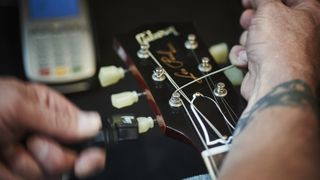 Person using a string winder to change electric guitar strings
Person using a string winder to change electric guitar strings
(Image credit: Future)
4 Signs Your Strings Need Replacing
While electric guitar strings are relatively inexpensive compared to major gear purchases like a new acoustic guitar or pedalboard, changing them can revitalize your guitar and inspire creativity.
The market offers a vast selection of electric guitar strings, and individual players will find certain brands and gauges (thicknesses) more suitable. Choosing strings is subjective, so experimenting with different sets to discover your preferences is highly recommended.
Ernie Ball Slinkys are a benchmark in electric guitar strings – their iconic packaging is easily recognizable, and their quality is undeniable. They offer a wide range of gauges to suit various playing styles and deliver excellent sound. The D’Addario EXL range is another comparable and highly regarded option.
Elixir Optiwebs are also exceptional, considered some of the best electric guitar strings due to their unique coating that extends their fresh tone and lifespan. D’Addario XT strings have also made significant advancements, providing coating across all six strings, improving upon traditional coated strings that only protected wound strings. When choosing good electric guitar strings, consider experimenting with different brands and types to find what best matches your playing style and tonal preferences.
FAQs
 Workbench with guitar strings, cutters, and string winder
Workbench with guitar strings, cutters, and string winder
(Image credit: Future)
What are electric guitar strings made of?
Good electric guitar strings are constructed from various materials, typically featuring a metal core (often steel) with windings around the lower-pitched strings (E, A, D). Heavier gauge sets might also have a wound G string. Common winding materials include nickel-plated steel, pure nickel, and stainless steel, among others like cobalt.
Nickel-plated strings are the most popular due to their balanced and even response, offering a blend of warmth and brightness. Pure nickel strings are generally warmer and mellower, while steel strings are brighter. When selecting strings, consider your guitar’s pickups. For naturally bright pickups, pure nickel strings can help mellow the tone, for example.
What are the benefits of coated electric guitar strings?
Coated strings have become increasingly prevalent. As the name suggests, they feature a very thin coating that protects the strings from dirt, sweat, and corrosion. This coating extends string life and maintains that “new string” sound for longer. However, they are typically more expensive, and some players dislike the feel of the coating. Newer coated strings, such as D’Addario XTs, are designed to feel almost identical to uncoated strings, addressing this concern. Coated strings are a good choice for players who want to minimize string changes and maintain consistent tone over time.
Which string gauge should I use?
Gauge, referring to string thickness measured in thousandths of an inch (e.g., 9s or 10s, meaning the thinnest string is .009 or .010 inches thick), is a crucial factor when choosing good electric guitar strings. Gauge significantly affects string feel and playability.
The strings are your primary physical connection to the guitar, making gauge selection important. Players with a heavier touch might prefer heavier gauges to reduce the risk of knocking strings out of tune. Lower tunings also often benefit from thicker strings for better tension and tuning stability.
Lighter strings require less effort to move, making bending easier. However, some players find lighter strings too easy to bend, leading to overbending. Matching your playing style and hand strength to the right gauge is crucial and might require some experimentation.
There’s no universally “correct” gauge; it’s largely personal preference. Beginners often find lighter strings easier to play, but many professionals also prefer them, having adapted their technique. While some believe thicker strings produce better tone, prioritizing comfort and playability is generally more important. Experiment to find the gauge that feels and sounds best for you.
When should I replace the strings on my electric guitar?
There’s no fixed rule for when to change electric guitar strings. Many guitarists do so every couple of months. However, frequent players (e.g., 3 hours daily) will wear strings out faster. Live performers, who sweat more, will also need to change strings more often – many professionals change strings after every gig.
Regular performers and studio musicians often change strings before each show or session to ensure optimal sound. Home players might change strings monthly or less frequently.
Strings have a limited period of peak performance. Factors like temperature and humidity changes, sweat, corrosive substances, and playing technique degrade strings over time. Changing strings regularly ensures consistent tone and playability.
For further guidance, see our article on how to restring an electric guitar.
Can you use electric guitar strings on an acoustic?
While electric guitar strings might physically fit on an acoustic guitar, they will not sound good. The best electric guitar strings are designed with materials that interact optimally with electric guitar pickups. Acoustic guitar strings are constructed differently to resonate and produce sound naturally through the acoustic instrument’s body. Using electric strings on an acoustic guitar will result in a weak, thin, and unamplified sound.
How we test electric guitar strings
 Changing strings on a Fender Stratocaster electric guitar
Changing strings on a Fender Stratocaster electric guitar
(Image credit: Future)
Testing electric guitar strings is an enjoyable process that involves playing guitars! We subject strings to various everyday playing situations to ensure thorough evaluation.
We start by stringing a guitar with a fresh set and observing how quickly they settle and stabilize tuning. Ideally, good electric guitar strings should become usable within minutes, needing minimal stretching to hold tune.
Next, we assess playability – the best strings should enhance the joy of playing. They should feel smooth, not sticky or rough. For coated strings, ideally, the coating should be imperceptible during play. Longevity is also tested by leaving strings on a guitar for extended periods, noting when they begin to tarnish and lose their bright, clear tone.
Sound quality is paramount. We test string tone across diverse musical styles to evaluate how they perform in different genres, carefully noting how the new strings alter the guitar’s overall sound. We aim to identify good electric guitar strings that offer a balance of playability, tone, and longevity for various playing styles and preferences.
Read more about our rating system, how we select gear, and our detailed testing process.

